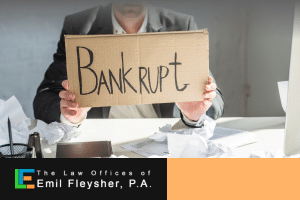This page was written, edited, reviewed & approved by Emil J. Fleysher following our comprehensive editorial guidelines. Emil J. Fleysher, the Founding Partner, has 15+ years of legal experience as a bankruptcy attorney. Our last modified date shows when this page was last reviewed.

Various financial problems cause bankruptcy. It could be caused by a sudden death of a sole provider, a severe medical emergency, an unforeseen loss of income source, or it could be because of the pandemic. Sometimes it's the amalgamation of multiple factors.
Declaring bankruptcy is not easy, but it can also be your only way out. If you consider declaring bankruptcy, we discuss here the ten things you need to know about declaring bankruptcy.

Bankruptcy is a legal process a debtor takes to default on a debt due to the inability to pay an outstanding balance. A person who went bankrupt means that their debt exceeds their assets.
The debtor needs to appear before the bankruptcy court when they want to file for bankruptcy. The court will conduct an investigation or tests (i.e., means test) to identify the debtor's ability to pay creditors.
After a thorough investigation, the court will declare what will happen next to your case. They will either allow you to establish a repayment plan, sell your non-exempt property, reorganize your business, or give you a bankruptcy discharge.
Bankruptcy filing involves various steps before you reach a court decision. It's best to seek the counsel of a bankruptcy lawyer before you file for bankruptcy. A lawyer can help you identify which classification of bankruptcy suits your case.

There are several reasons why a business or an individual declares bankruptcy. However, it all boils down to their inability to pay a debt due to a bad financial situation.
Major life changes force people to file for bankruptcy. The death of a loved one, a significant medical emergency, and loss of stable monthly income are the most common reasons individuals file bankruptcy.
Some businesses utilize bankruptcy as a tool to help them manage their tax payments. Business owners usually declare bankruptcy to change their debt or tax payment terms.
It's vital to assess your current finances thoroughly and whether you can clear your existing debt within three to five years. The bankruptcy court may allow you to restructure a debt payment schedule within these years.
Suppose that you cannot settle your debts within five years. In that case, bankruptcy may be your only option for debt relief.
It's vital to remember that bankruptcy records appear on your credit history for seven to ten years. A bankruptcy record may pose a challenge if you are planning to obtain an S.B.A. or Small Business Administration loan.

The court can help you prioritize your debts when you declare bankruptcy. Furthermore, they can also help you by allowing you to pay your debts within three to five years while you reorganize your business and finances.
The bankruptcy court will identify and categorize your outstanding debts when you declare bankruptcy. The bankruptcy court will sort your debts as a priority, unsecured, or secured debts.
After filing bankruptcy, the court will categorize your case into either one of these three:
This is not an exhaustive list of the Bankruptcy Code Chapters. However, 90% of bankruptcy cases fall into either one of these three.

At this point, you already know what bankruptcy is, why people declare bankruptcy, and how it can be beneficial for you. Before you jump into any action, here are ten things you need to remember when filing for bankruptcy.
Bankruptcy cases are either Chapter 7, 11, or 13. However, Chapter 11 is only applicable for business bankruptcy.
Individuals who want to declare personal bankruptcy can choose between a Chapter 7 bankruptcy or a Chapter 13 bankruptcy.
You must identify which Chapter of the Bankruptcy Code applies to your situation with your lawyer. The court may conduct an investigation or a test to verify your eligibility for a specific personal bankruptcy chapter.

You must remember that filing for bankruptcy should be your last resort. There are financial assistance alternatives applicable to your situation. It's vital to check them out first before you file for bankruptcy.
A consumer bankruptcy attorney can help you identify viable options to settle your debt. Bankruptcy should never be your go-to solution at times of great financial burden.
If you plan to file a bankruptcy claim, try not to take out a considerable debt within 70 to 90 days before declaring yourself bankrupt.
Unless the vast debt was necessary or you will use it for an emergency, the court can deny your claim and declare your case fraudulent. Furthermore, transferring a property to a relative before filing bankruptcy can also be considered an act of fraud.
Although withdrawing your retirement funds is a viable option to settle debt, it shouldn't be your first option. In most cases, your retirement funds are protected by the law.
Remember, filing for bankruptcy can provide debt relief. This means that you don't need to exhaust your retirement savings to pay your outstanding debt.

Don't expect the court will waive all your debts after filing bankruptcy. Certain debts, such as priority debts and student loans, are hard to shake off.
Priority debts such as child support, tax, and income-related debts are not discharged in most bankruptcy cases. The law will mainly require debtors to pay these debts despite the situation.
Furthermore, exempting student loans is a tedious process. Often, these loans are not suspended even when you file for bankruptcy. The law will only waive a student loan if you can prove you are experiencing an 'undue hardship.'
With secured debts, your creditors reserve the right to claim your collateral property. In contrast, most unsecured debts are waived-off with a bankruptcy claim.
When you file for bankruptcy, you could lose some, if not all, of your personal property. The court will determine which properties will go and which you can keep.
In Chapter 7 bankruptcy, the trustee will sell all your non-exempt property to pay most or all of your creditors. With Chapter 13, the law will require you to pay your creditor the same amount of your non-exempt asset through an alternative payment plan.
Some states may have additional regulations in filing bankruptcy or keeping a property during bankruptcy. Take Virginia, for example. In Virginia, debtors over the age of 65 or veterans may exempt up to $10,000 for their personal property.
There are also states which allow debtors to choose between state exemptions or federal exemptions. You need to consult with a local legal expert to verify these state-specific regulations.

Filing bankruptcy is not a quick fix for your debt problems. In fact, Chapter 7 bankruptcy has the fastest turnaround time of four to six months. Chapter 13 might take around three to five years before you are declared debt-free.
The timeline of the Chapter 7 bankruptcy process is outlined below:
The timeline of the Chapter 13 bankruptcy process is enumerated below:
Bankruptcy cases are often complicated and ironically expensive. Filing bankruptcy cases requires you to submit countless forms and recover various documents.
Failure to provide the required documents and missed payments could put your case at risk. A trustee or the court can deny a claim for these reasons.
Hiring an experienced bankruptcy lawyer can help you keep the ground running and ensure that you will never miss any case deadlines. However, hiring an attorney will subject you to paying the attorney fees.
The attorney's service fee varies for every lawyer. Most lawyers offer a free case consultation. You must take advantage of this offer to assess the skill set of your prospective lawyer.
Keep in mind that you still have to pay the filing fees. These fees vary depending on the nature of your case. In general, a Chapter 7 bankruptcy would cost slightly more than a Chapter 13 bankruptcy.

You must remain honest about your assets, debts, liabilities, income, etc. The court can deny your case or, worse, charge you with perjury when they discover that you are withholding vital and truthful information.
In addition, the court may also issue a bankruptcy fraud case against you. Bankruptcy fraud is a felony federal offense. Convicted defendants can face a penalty fine of up to $250,000 and a 5-year imprisonment sentence.
Debtors who file for bankruptcy should be prepared to share their financial situation with the public. All bankruptcy claims are considered public records by the court. In addition, your trustee will also hold a public forum for creditors. During the discussion, your trustee will ask you questions pertaining to your personal finances.
A bankruptcy record will appear in a debtor's credit history for about ten years in most cases. During these years, a debtor may find it hard to apply for loan approvals in the future.
Moreover, applying for an S.B.A. or Small Business Administration loan is more challenging when you have a business bankruptcy record in your credit history.
Filing for bankruptcy also has its limitations. For example, a debtor with a Chapter 7 bankruptcy record can file for another bankruptcy after eight years. In contrast, a debtor with a Chapter 13 record can only file another bankruptcy case after six years.

Here's an overview of what you need to do when you file for bankruptcy:

Our experienced bankruptcy attorney at the Law Offices of Emil Fleysher has helped thousands of debtors find a fresh start from their insurmountable debts.
Our principal bankruptcy lawyer is proficient in Chapter 7 and 13 Bankruptcies, Debt Settlement Cases, Foreclosure Defense, Loan Modification, and Short Sale Cases.
Call us now at 888.886.0020 fora free legal consultation. You can also submit your consultation request using our online contact form. Drowning in debt? We can lend a hand!

Emil specializes in consumer bankruptcy, debt settlement, and mortgage modification, offering a holistic approach to solving mortgage and debt problems. Emil listens to clients, understands their circumstances and goals, and helps them make the right choices by presenting all options and contingencies.
He is dedicated to helping South Floridians regain their financial freedom from overwhelming debt caused by high interest credit cards, bad mortgage loans, and uninsured medical expenses.

"*" indicates required fields